Stay in the know on all smart updates of your favorite topics.
Arnhem food cooperative with Amsterdam roots

In 1901, sixteen dairy farmers in the vicinity of Amsterdam, decided to establish the "Ilpenstein" cheese factory. My grandfather, Piet Nieuweboer, was one of the directors of the cooperative. The reason for collaboration within the cooperative? Cheesemaking traditionally takes place at the farm itself. The cheese factory made it possible to use innovative cheesemaking techniques. Even more important was the collaboration to improve the distribution and marketing of the cheese towards customers.
With the course "Biologisch Tuinieren in de Stad", we have trained almost two hundred new urban farmers in the city of Arnhem. Organic urban farmers with a food garden of half a square meter till half a hectare. It is a dream that these organic urban farmers, and others, will eventually find and learn from each other. Our initiative is the establishment and growth of the "Biologische Stadsboeren Coöperatie Arnhem Groen". An organic urban farmers' cooperative focused on economic collaboration in a green Arnhem.
Vacancy: PhD position on The Organization of Innovation for Sustainability Transition at Vrije Universiteit Amsterdam
Have you obtained a master's degree in social and/or organization sciences, and would you like to study innovation and change? Then consider joining our interdisciplinary team with a PhD research on accelerating sustainability transitions!
This PhD position is part of an interdisciplinary team of three PhD researchers, one postdoc, and two senior researchers in the project ‘EXTRA’: <em>From EXperiment to sustainable change: TRAnsformative methodologies for innovation and learning</em>. EXTRA is a collaboration between multiple universities and public and private partners to research and advance physical and experimental environments as enabling methodologies for learning and innovation, also known as living labs.
Living labs are applied by various change-makers, including governmental actors, industry partners, NGOs, researchers, and citizens, to co-create innovations. However, while much experimentation and innovation occur, achieving long-term systemic change remains difficult. Therefore, the main purpose of EXTRA is to amplify the transformative power of living labs with novel insights, instruments, and human capacities, thus enabling change-makers to make sustainable changes and societal impacts.
In the consortium this PhD research will focus on the organization of innovation to accelerate sustainability transition. More specifically, by gathering knowledge and analyses across different fields and cases, this research will identify and validate (inter)organizational approaches, interventions, and business models to overcome barriers and enable the public-private collaboration needed for embedding, translating, and scaling innovations.
For more information about the project, please visit: https://www.nwo.nl/nieuws/financiering-voor-onderzoeksproject-over-fysieke-experimentele-omgevingen ; https://www.tudelft.nl/2024/bk/nwo-financiering-voor-innovatief-onderzoek-naar-fysieke-experimentele-omgevingen.
Jaarevent C-Creators 2024: Onderweg naar morgen - transitie in beweging 🌍 🔄

Jaarevent C-Creators 2024: Zet de Bouwketen in Beweging
<strong>Datum</strong>: 14 november 2024
<strong>Locatie</strong>: A Lab, Amsterdam
<strong>Tijd</strong>: 14.00 - 17.30 uur (inloop vanaf 13:30, met aansluitende borrel)
<strong>Thema</strong>: “Onderweg naar morgen – Transitie in beweging”
<strong>Beschrijving</strong>: Het Jaarevent 2024 van C-Creators brengt pioniers, beleidsmakers en ketenpartners samen om concrete stappen te zetten richting een circulaire toekomst in de bouw. Tijdens dit inspirerende evenement krijg je de kans om kennis op te doen, te netwerken en mee te denken over de toekomst van circulair bouwen.
Waarom deelnemen?
- Leer meer over de nieuwste innovaties in circulair bouwen.
- Netwerk met gelijkgestemden en ontdek nieuwe samenwerkingsmogelijkheden.
- Ontvang praktische handvatten en inzichten om direct toe te passen.
<strong>Hoogtepunten</strong>:
- 🎤 Keynote van Vincent Luyendijk over duurzame gebiedsontwikkeling.
- ☕️ Stakeholder Cafés over biobased bouwen, houtbouw en hergebruik.
- 🎮 Netwerkspel “Spaar ze allemaal” voor waardevolle connecties.
- 🌍 Interactieve Expo met inspirerende circulaire projecten.
<strong>Voor wie</strong>: Bouwprofessionals, woningcorporaties, architecten, ontwikkelaars, gemeenten, slopers en investeerders.
<strong>Aanmelden</strong>: Deelname is gratis, maar de plaatsen zijn beperkt!
🔗 Meld je nu aan en sluit je aan bij de koplopers in de circulaire bouwsector.
Reflexive Monitoring course
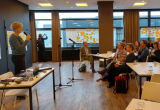
If you're working on system change, you will face plenty of uncertainty and polarisation. The outcome is also unpredictable: we're working on a different future, but we don't know exactly what that will look like. And systems change requires an integrated approach, as different aspects - from technology to politics - have to change simultaneously. So in transitions, merely setting and hitting targets won't do.
This 3-day, Dutch-language course introduces you to valuable knowledge, tools and approaches, aimed at learning and adapting in transitions – for all transition makers who want to improve their monitoring game. It's taught by Barbara van Mierlo, associate professor at Wageningen University & Research and a founder of the methodology 'Reflexive Monitoring in Action' as well as PJ Beers, senior researcher at DRIFT and lecturer at HAS Green Academy.
Sign-up for 2025 is now open.
EIT Culture & Creativity is hiring Business Developers
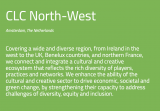
We're Hiring Business Developers in the Cultural & Creative Industries.
Are you a business developer with a network in the cultural creative industries?
EIT Culture & Creativity (EIT CC) is the Knowledge and Innovation Community (KIC) of the European Institute of Innovation and Technology (EIT) for the Cultural and Creative Sectors and Industries.
By fostering interdisciplinary and cross-sectorial collaboration for stakeholders from education, innovation, research, business and culture, EIT CC provides new connections and unique opportunities from its European innovation community across 15 sectors and 30 nations. Its purpose is to help all players in the European Cultural and Creative Sectors and Industries to turn innovation into impact.
We envision to improve competitiveness, resilience and sustainable economic growth of the CCSI by fundamentally changing our collective understanding of entrepreneurship.
GO!-NH Growth helpt jouw onderneming groeien

Hé duurzame ondernemer,
- Ben jij werkzaam bij een startup of innovatief mkb die bijdraagt aan de duurzaamheidsdoelstellingen?
- Focust jullie innovatie zich op de energietransitie, circulaire economie, bouw, fashion of agrifood?
- Zijn jullie gevestigd of actief in Noord-Holland?
- En ben je klaar om flinke groeisprongen te maken?
Dit najaar starten we met een nieuwe ronde GO!-NH Growth. GO!-NH is een versnellingsprogramma van provincie Noord-Holland en regionale ontwikkelingsmaatschappij ROM InWest en helpt jou in drie maanden met het laten groeien van jouw onderneming. Dat doen we door middel van workshops, matchmaking en individuele begeleiding van experts.
Al meer dan 180 impactvolle bedrijven gingen je voor! Waaronder The Good Roll, Bedaffair, Tommy Tomato, AirHub, FastFeetGrinded, MakersUnite en DOPS.
"Het helpt om even afstand te nemen en opnieuw naar de propositie, klanten en strategie te kijken. En ook te leren van de best practices van anderen.", Julie Munneke, Tiny Library.
Meer informatie over het GO!-NH programma vind je op de website of in onze brochure. Direct aanmelden voor het programma kan hier: go-nh.nl/inschrijfformulier/.
Enhance Your Business Processes with Expertise and Insight
Dear,
My name is Denis Yaa Kyerewaah, and I am a business administration student at the Amsterdam University of Applied Sciences. For my project, I am seeking a current and relevant business challenge where I can provide insights and add value to your organization. I would like to propose a collaboration to optimize and improve your business processes.
Project Objective:
The goal of this project is to deliver a concrete advisory and implementation plan for a specific business process within your organization. This project will focus on one of three core areas: Operational Management (OM), Information Management (IM), or Organizational Behavior (OB).
Project Proposal:
- Core Area: [Choose one: OM, IM, OB]
- Challenge: [Briefly describe the relevant business challenge]
- Objective: Provide insights into current processes and explore opportunities for optimization and improvement.
Project Approach:
- Preliminary Research (3 weeks):
- Conduct a minimum of 3 interviews per week with relevant stakeholders.
- Analyze current business processes and identify optimization opportunities.
- Research and Advisory Phase:
- Conduct an in-depth analysis of the chosen challenge.
- Develop a concrete advisory and implementation plan.
- Implementation Phase:
- Support the implementation of the advisory plan.
- Evaluate results and make necessary adjustments.
Critical Success Factors and Requirements:
- Time and Support: Access to multiple stakeholders for interviews, questions, and support throughout the project.
- Organizational Requirements:
- Minimum of 20 employees (exceptions possible upon approval).
- At least 2 years of operational history.
- Supervisor with at least a higher professional education (HBO) level.
Benefits for Your Organization:
- Gain insights and optimize a key business process.
- Receive a concrete and actionable implementation plan.
- Collaborate with motivated and well-trained business administration students.
I believe this collaboration will be mutually beneficial, and I look forward to discussing this further with you. Could you let me know if you are open to a meeting to explore the possibilities?
Thank you in advance for your time and consideration.
Kind regards,
Denis Yaa Kyerewaah
0634425063
Amsterdam University of Applied Sciences
No Failure No Glory
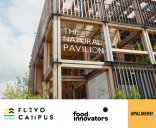
Flevo Campus, Food Innovators and UPALMERE! are organizing this No Failure, No Glory evening.
Entrepreneurship is having courage, seizing opportunities, and above all, sticking your neck out. Mostly with success and at the same time, running the risk of making wrong decisions due to all the challenges.
Often the focus is on the successes, and we like to share those, but there is much to be learned from mistakes others have already made. That's why Flevo Campus and UPALMERE! are organizing this No Failure, No Glory evening. Let yourself be nourished and inspired by candid entrepreneurial stories.
Program:
Networking with Drinks and Bites: From 17:00 to 17:30, you can network in a relaxed atmosphere and enjoy delicious snacks and drinks.
From 17:30-18:00 we start the No Failure, No Glory stories: Led by Janno Lanjouw, journalist at Flevo Campus, various entrepreneurs will share their most instructive moments of failure in sessions of 15 minutes each. Expect vulnerable, yet humorous stories about companies that struggled in the start-up phase, reacted too late to market changes, or were ahead of their time. What went wrong? And what did they learn from it and how did it make them more successful?
Q&A: After each story, you have the opportunity to ask your questions. Dive deeper into the experiences of these entrepreneurs and learn from their insights.
Wrap Up and Drinks: At 19:00, we will conclude the evening with drinks, giving you the opportunity to continue conversations, exchange ideas, and make new connections.
Sign up via link and join this event!
Are you an innovative entrepreneur? The In Residence Open Events program might be your chance to cooperate with Amsterdam!

Want to test your innovation during an open event such as Amsterdam Pride or the Amsterdam marathon? And looking for the opportunity to cooperate with the city in the long run?
The In Residence Open Events programme might be something for you. We have 8 broad defined challenges, ranging from circular economy to safety, from mobility to extreme whether. Basically we're looking for all innovations that can have an positive impact on the city and the event of the future!
During the programme you get:
- The opportunity to pilot your solution at an open event in Amsterdam, such as Amsterdam Pride or the Amsterdam Marathon
- 15K test budget to execute this pilot
- Guidance by an experienced mentor
- Access to the large municipality network
- The opportunity for long term cooperation in case of a succesfull pilot
- Large exposure and feedback opportunities
Interested to see our programme, the challenges and opportunity this brings for you?
See our website, www.innovatiepartners.nl, or see most recent LinkedIn post: https://www.linkedin.com/posts/gemeente-amsterdam-innovatie_inresidence-amsterdam-innovatie-activity-7163881081757253632-6soh?utm_source=share&utm_medium=member_desktop
For questions or thoughts, you can reach out to Mark Stoevelaar, project manager of the In Residence programme.
- mark.stoevelaar@amsterdam.nl
- +31621193028
Amsterdam Region’s Insights on Local Green Deals during COP28
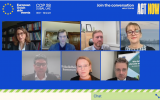
Participating in a COP28 side event organized by the European Commission, the Amsterdam Region delved into Local Green Deals as instrument for achieving the green transition. The primary goal for the session was to uncover actionable strategies and prerequisites essential for fostering public-private collaboration to realize the sustainability transition. Marja Ruigrok, vice-mayor for the municipality of Haarlemmermeer, represented the Amsterdam Region alongside political and business leaders from Braga (Portugal), Aalborg (Denmark) and Skelleftea (Sweden).
Commencing the session, Valentina Superti, DG for Internal Market, Industry, Entrepreneurship, and SMEs at the European Commission, highlighted Europe's ambition to become the first climate-neutral continent by 2050. This necessitates a transformative shift towards sustainability, digitalization, and resilience, which is why the Commission is introducing critical legislation like the Net-Zero Industry Act and the Critical Raw Materials Act.
Ruigrok shared insights from the Amsterdam Metropolitan Region’s efforts in establishing Local Green Deals, emphasizing her role as political ambassador and champion for the Green Deal Bikes initiative. She stressed the importance of cycling, explaining that despite its reputation as a cycling paradise, approximately 20% of young people in the Amsterdam Region can not ride a bike: “If you don’t learn to ride a bike at a young age, you are also much less likely to use a bike for commuting later in life. That’s why in this Green Deal, we stimulate young people to learn to ride bikes, and encourage employers to support commuting by bike. This is crucial because employees who bike take on average 2.5 fewer sick days compared to those who don’t bike.”
Reflecting on success factors, Ruigrok emphasized the need for political commitment, and clear project ownership: "From a political point of view, you need long term commitment, and you have to create ownership. Someone has to take ownership and say ‘this is my project.’ This might be a governmental agency, a company, a knowledge institution, or civil society organisation - but someone has to take the lead. Otherwise, you will continue to talk, and nothing will happen."
Throughout the session, participants provided practical insights and recommendations for fostering successful public-private collaborations in general, and Local Green Deals in specific:
- Lasse Frimand Jensen, mayor of the City of Aalborg, emphasized the necessity of accountability mechanisms: “Mutual commitment is necessary and there must be mechanisms in place to keep each other accountable.”
- Ricardo Rio, mayor of City of Braga and Member of the European Committee of the Regions, highlighted the role of local authorities in mobilizing capacity and engaging stakeholders: “Local authorities need to have the spirit to engage stakeholders and shape partnerships. We also need governance models that tranced political cycles, and that allow people to participate and hold us accountable.”
- Jens Broberg, representing the business sector, emphasized the urgent need for appropriate incentives: “Governments must use policy frameworks to incentivize and regulate businesses and industry towards a green economy.”
- Evelina Fahlesson, vice-mayor of Skelleftea Municipality emphasized the need for open and honest dialogue: “As a municipality, you have to be open about your challenges and willing to start a dialogue with your citizens and companies. Use procurement and new financing models as tools to implement a shared vision.”
- David Nordberg, from Skanska Sweden, encouraged business leaders to align their business models with sustainability ambitions: "Be brave: try new ways of doing business and work in collaborations. In the long term, there is no conflict between sustainability and the economy."
The session highlighted the pivotal role of collaborative multi-stakeholder partnerships in achieving the green transition, emphasizing sustained political commitment, robust governance structures transcending political timelines, and policy frameworks incentivising sustainable businesses.
In the context of COP28, the true challenge lies in replicating these successful approaches on a wider scale, extending beyond the relatively affluent European context to a global landscape with more limited resources. In many regions, the urgent and acute impacts of climate change are already pervasive, amplifying the need for swift, comprehensive action. This necessitates a global and concerted effort of nations and industries, to surmount the hurdles posed by resource scarcity and varying levels of socio-economic development. This calls for collaboration not only within regions but across continents, fostering knowledge-sharing, technology transfer, and collective efforts in tackling climate challenges. The urgency of the climate crisis demands a united global front, where the lessons learned and successes achieved in Local Green Deals can serve as guiding principles towards a more sustainable and resilient future for all.
CTwalk Map
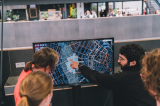
What opportunities for social cohesion do cities provide?
Is your neighbourhood park frequented by a homogenous or diverse mix of people? How many hashtag#amenities can you reach within a short hashtag#walking distance? And do you often encounter people from different walks of life?
I am very excited to introduce to you CTwalk Map, a web tool that seeks to highlight the social cohesion potential of neighbourhoods while also unmasking local access hashtag#inequities. CTwalk maps opportunities that different age groups can reach within a 5 or 15-minute walk.
🚶♀️🚶♂️ It uses granular population, location, and pedestrian network data from open sources to estimate how many children, adults, and elderly hashtag#citizens can reach various destinations in a city within a short walk.
🌐 It offers a simple and straightforward understanding of how the 5 and 15-minute walking environments are shaped by the street network.
➗ It estimates the degree of pedestrian co-accessibility of various hashtag#city destinations.
CTwalk Map is now available for the five largest cities in The Netherlands.
Take a look at the web tool:
https://miliasv.github.io/CTwalkMap/?city=amsterdam
... learn more about CTwalk Map at this link:
[currently does not support mobile phones or tablets]
...and let us know what you think!
Hoe creëer je Levende Lerende Netwerken die impact hebben?
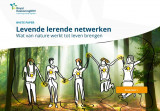
Hoe maak je de stap van gezamenlijk leren, naar samen echt dingen doen? Er is al veel over gezegd en geschreven... Communities of practice, smeden van allianties, enz enz... Vaak blijft het dan een beetje hangen bij het organiseren van een toffe sessie, vast met veel energie. En daarna gaat iedereen - als het goed is met nieuwe ideeën en inspiratie - weer verder met waar 'ie al mee bezig was. Vaak is dat al genoeg, maar zeker in transities wil je eigenlijk een stapje verder komen.
Is eigenlijk al wel voldaan aan een aantal belangrijke condities om het netwerk levend te maken en te houden?
Reflecterend op onze eigen praktijk, ontdekten we een aantal kenmerken die belangrijk en beïnvloedbaar zijn bij het bouwen van impactvolle levende lerende netwerken. Amsterdam Smart City zelf is zo'n voorbeeld, waarin we voortdurend met elkaar op zoek zijn naar hoe we onze samenwerking van betekenis kunnen laten zijn voor de duurzame transities in onze regio. De Green Deal Circular Festivals, het MRA Platform Smart Mobility, Sail Amsterdam, en het Initiatief Bewust Bodemgebruik zijn enkele andere voorbeelden van levende lerende netwerken. Ook hier zagen we telkens dat de volgende kenmerken van belang zijn om verder te komen, en om de stap te maken van samen leren, naar samen doen:
(1) Wederzijdse afhankelijkheid tussen deelnemers
(2) Beweging door gedeelde energie
(3) Diversiteit daagt uit
(4) Persoonlijke ontwikkeling, empathie, ego overstijgend
(5) Veilige ruimte om te leren en ontwikkelen
Op basis van onze ervaringen in de praktijk, hebben we onze kijk op het ontstaan, de kenmerken en het begeleiden van Levende Lerende Netwerken opgeschreven in een whitepaper. Wil je meer weten, dan kun je die downloaden via onderstaande link (naar beneden scrollen naar de download knop van de Levende Lerende Netwerken Whitepaper).
Tijdens het PGM Open Congres op 26 september organiseren we hierover een workshop voor programmamanagers (https://lnkd.in/gcRPv4V8). En, je kunt me natuurlijk altijd een berichtje sturen als je meer wilt weten!
GO!-NH SHOWCASE DAY 2023

We nodigen jou graag uit voor de ronde-tafel themasessies tijdens GO!-NH Showcase Day, een evenement dat gewijd is aan het bevorderen van duurzaamheid en ondernemerschap in de provincie Noord-Holland. Deze sessies bieden een unieke gelegenheid om dieper in te gaan op de belangrijkste duurzaamheidsthema’s van onze regio, met daarbij concrete innovaties, resultaten, uitdagingen en ambities van de deelnemende ondernemers.
Denk aan thema’s als:
Domeinen: Bouw, Voedsel, Energie, Textiel, Duurzame Maakindustrie, Gaming en Tech
Onderwerpen: Impact, Sociaal Ondernemerschap, Circulaire Economie, gebiedsontwikkeling, Donut Economie
Financiering: Investeerders, Impact investeerders, Kapitaal.
9.00 UUR TOT 14.00 UUR
AFAS STADION, ALKMAAR
Wat maakt deze ochtend zo bijzonder? De samenstelling van de groep bestaat uit een select gezelschap (van rond de 100 personen) van impact ondernemers en hun zeer nauwe relaties, klanten, (potentiële) investeerders, beslissers en bestuurders uit bedrijfsleven en overheden. Juist door de intieme setting verwachten wij verrassende ontmoetingen en diepe verbindingen met en tussen de ondernemers en de gewaardeerde relaties en partners vanuit ons innovatie-ecosysteem in Noord-Holland.
Master thesis about smart mobility solutions, also in Amsterdam
Hi everyone!
I'm currently writing my thesis on smart mobility solutions and their (expected) impact in the fight against climate change. As I'm also looking at cooperation between cities, I'd be very grateful if through posting this, I could get answers to the following questions.
- Does Amsterdam cooperate with other cities in the development of smart mobility solutions, like Roboat, Vehicle-2-Grid, or eHubs?
- Do other cities contact Amsterdam for advice and expertise with their smart mobility initiatives?
Thank you all and have a nice week ahead!
Finn
Online Workshop: Code your first Chrome extension

This workshop is for total beginners!
This is an online workshop. Sign up on Livestorm
Chrome extensions such as Adblockers, Webpage translators, third-party apps (e.g. Evernote) integrators, and many others, can be extremely powerful, and also very fun to use. This workshop is for total beginners!
In this workshop you will learn:
• How to build step-by-step your first Chrome extension
• Publishing your first Chrome extension
• The key concepts to understanding how these extensions work
About this online workshop:
This workshop will start with a 1-hour lecture to introduce the core concepts. You will then be onboarded on Le Wagon's e-learning platform and access the slides, a sum-up of key notions as well as exercises to keep practising after the workshop.
This workshop is brought to you by the #1 rated coding bootcamp worldwide:
Le Wagon emerged in 2014 as one of the first tech bootcamps in France, offering web development and data science programs. Now, it has grown to a robust global community of tech talents with 45 Le Wagon campuses in Amsterdam, Berlin, Lisbon, London, Melbourne, Mexico, Montreal, Singapore, São Paulo, Paris, Tel Aviv, and other cities worldwide. With this expansion, Le Wagon has helped over 20,000 developers, data scientists, designers, and entrepreneurs start their new careers in tech. Eight years on, the school continues to inspire tech aspirants to find their path in the industry.
Online Workshop: Women’s Coding Day

Le Wagon Women's Coding Day is a full morning of coding dedicated to all women who want to gain coding skills
This is a free online workshop for women! Sign up on Livestorm
Le Wagon Women's Coding Day is a full morning of coding dedicated to all women who want to gain coding skills 💪. If you are interested or know women who want to discover to code, this is the place!
Our team of female teachers will assist you during this workshop on the basics of HTML and CSS. In this workshop you will learn:
✨ The tools you need to design, build and host your own landing page
✨ How to structure your landing page with HTML, then style it with CSS and finally get your website live
✨ All the necessary tools to start designing and building pages yourself without any prior coding experience!
About this workshop: This online workshop will start with a lecture to introduce the core concepts. You will then be onboarded on Le Wagon's e-learning platform and access the slides, a sum-up of key notions as well as exercises to keep practising after the webinar.
This workshop is brought to you by the #1 rated coding bootcamp worldwide:
Le Wagon emerged in 2014 as one of the first tech bootcamps in France, offering web development and data science programs. Now, it has grown to a robust global community of tech talents with over 40 Le Wagon campuses in Amsterdam, Berlin, Lisbon, London, Melbourne, Mexico, Montreal, Singapore, São Paulo, Paris, and other cities worldwide. With this expansion, Le Wagon has helped over 20,000 developers, data scientists, designers, and entrepreneurs start their new careers in tech. Nine years on, the school continues to inspire tech aspirants to find their path in the industry.
How to live with global warming larger then 3 degrees C

In my previous post (in Dutch) I summarized the main conclusions of the IPCC's Final Report: The probability that the world will have warmed by more than three degrees by 2100 is much greater than that we hold it at 1 1/2 degrees Celsius. In this post I will discuss the consequences of this for the world, whether there is still a way out and what the consequences are for Dutch policy.
Lunch Pensant UPALMERE!
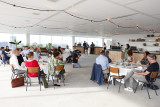
Are you a start-up, scale-up or innovative company and would you like to discuss relevant themes with other innovative entrepreneurs in order to grow and scale? Then you are cordially invited to register for the UPALMERE! lunch Pensant 2023!
After a successful Diner Pensant in 2022, UPALMERE! we organize a second edition this year. This time it will be in the form of a lunch, or Lunch Pensant, from 12.00 – 14.00 in Almere. Participate in this attractive Lunch Pensant with 'nice conversations and delicious dishes at the table'. Be inspired by interesting guest speakers, talk and think along about innovative challenges, expand your network, enjoy the delicious food and musical accompaniment of the lunch!
Who wants to be at this Lunch Pensant for?
This edition is extra special and exclusively intended for startups & scale-ups located in the Amsterdam Metropolitan Area.
Kodingsdag: Coding Day at Le Wagon

Kodingsdag: Coding Day at Le Wagon
Registration required on Eventbrite!
After Koningsdag 👑 comes Kodingsdag 👩💻- a full morning of coding dedicated to all who want to gain new in-demand tech skills 🚀
Join us on campus on April 29th for a workshop fit for the future tech royalty!
Learn how to code your first Landing Page or build your first Machine Learning model with Python - all while celebrating in the spirit of King's Day!
And the best part? This workshop is completely free, so you don't have to spend a dime. Sign up now and start building your kingdom of tech! 💻
InnoBuyer: Looking for public and private organisations with challenges to solve

InnoBuyer is an EU-funded project that brings together public and private organisations (Challengers) and innovative companies (Solvers) to jointly co-create innovative solutions, and speed-up the process leading to a concrete innovation procurement.
The Call for Challenges is open to public and private buyers, with specific challenges to solve, lacking the expertise and resources to address them, but willing to co-create innovative solutions with SMEs.
Applications can be submitted by the 31st of March 2023 at 17:00 CET.
For more information about the call and to apply visit:
https://innobuyer.eu/challengers/
Stay up to date
Get notified about new updates, opportunities or events that match your interests.

